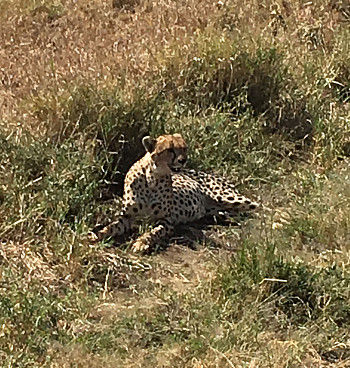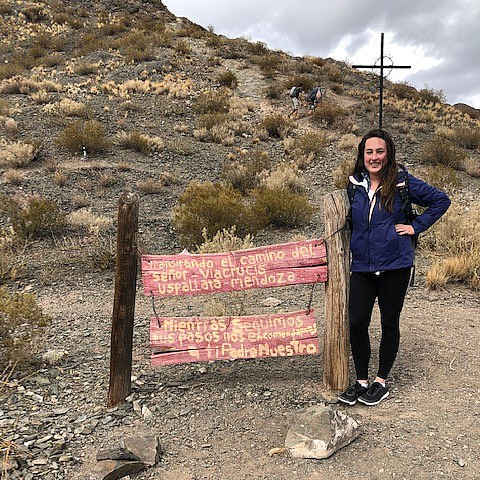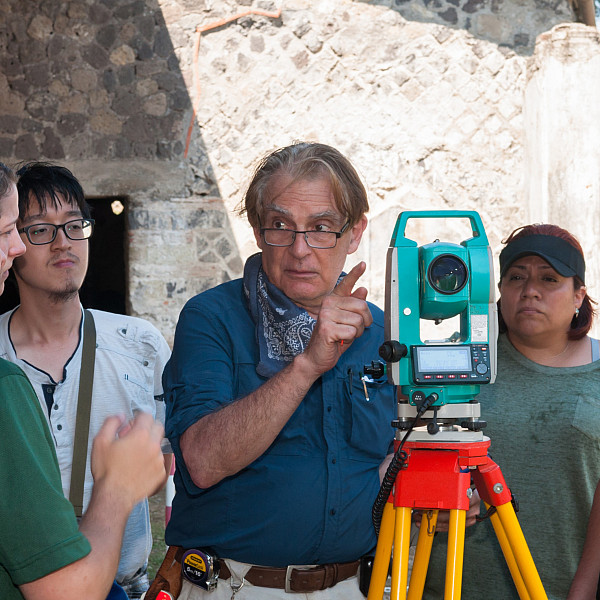News
On the Plains of Africa
May 02, 2019
May 02, 2019
![Tanzania was the greatest opportunity to see [the cats and other animals] in their natural habitat. - Sarah Barton '20](/live/image/gid/30/width/350/height/467/32438_D7BB017C-AEA9-4EF3-BEC0-F6D81B553939.rev.1556818556.jpg)
Now a psychology major and animal studies minor at Southwestern, Barton has never lost her passion for animal rescue and conservation. So when she learned about a study-abroad program in Africa with the School for Field Studies Center for Wildlife Management Studies, she knew she had to apply. “Tanzania was the greatest opportunity to see [the cats and other animals] in their natural habitat,” she recalls. “I wanted to go somewhere where I could study exotic animals, and my top two choices were Tanzania and Australia. When I looked at the catalog for Tanzania, I saw that we’d get to study wild African mammals, like lions, leopards, and elephants—all of my favorite animals—so that was my greatest dream come true.”
Into the wild
Located on the plains of East Africa, where buffalo, rhinos, and yes, big cats roam beneath the distinctive baobab and iconic acacia trees, Tanzania is home to the continent’s largest mountain, Kilimanjaro, and ecologically rich landscapes, such as the Serengeti. During the month she spent there, Barton engaged in a course about the country’s wildlife conservation efforts and had the opportunity to study baboons and elephants. Her group traveled to Tarangire and Ngorongoro National Parks and then camped in the Serengeti, where they conducted animal and conservation-related studies. Such studies often involved expeditions to scout for and observe specific species: her team would travel around a park, locate a group of animals, and then take note of their behaviors. She remembers that during one four-hour trip, the students watched baboons “grooming each other and a mother and her baby suckling. We’d see what they were eating and [whether] there were any fights or playtime or mating going on—we did see that.”
But observing the animals was not the only objective, Barton adds: “It was also focusing on ways of having environmentally friendly communities, [such as] finding out how many plant species next to a river have been devastated because of human encroachment.”

Barton describes with equal relish her various other animal encounters. There was the herd of elephants who ventured up to their campsite to drink from a nearby pool. And at night, hyenas would close in. Barton didn’t see the catlike carnivores herself; her classmates who got up in the middle of the night to use the restroom did. But aside from their better-known “laughter,” the hyenas could be heard making distinctive vocalizations that Barton says resembled a cross between a man cheering at a football game and a dog’s clipped howl. “I would hear that sometimes at night at camp,” she recollects. “It’s kind of cool—but at the same kind of terrifying.”
Adapting to cultural change
Barton’s experience was not without its challenges, as any study-abroad veteran would admit. For her, the academic and field work were enjoyable, dream fulfilling, and life changing, but adjusting to Tanzanian culture sometimes required greater forbearance.
“The food was good, but I had never wanted a burger so badly,” Barton giggles. “I ended up almost going the vegetarian route, but I am not a vegetarian, so that was kind of hard for me.” When it came to cuisine, she was often offered ugali, which is comparable to Italian polenta cakes but is made from coarse-ground white cornmeal and often accompanies some sort of meat dish and pineapple. She loved the fresh fruit and appreciated alternative carbohydrates, such as rice or pasta, but she often found that the community’s pastorally raised, free-range cattle were often quite lean and produced rather gamey-tasting meat, unlike the fat, tender livestock available in the U.S.

Language barriers sometimes came into play as well. Although they spoke some English proficiently, two of her native Tanzanian professors had particularly thick accents, which sometimes proved difficult to understand. Similar obstacles sometimes arose at her homestay. Living with a local family while studying abroad is a rewarding opportunity for cultural exchange, but occasionally, “some of them didn’t know the English word, and we didn’t know the Swahili word,” Barton says—leaving both sides a bit mystified.
Thankfully, an onsite course in Swahili enabled Barton to improve her speaking skills. Before her trip, she says, “I did two days on Duolingo [a popular language-learning app], and it was not enough,” she laughs. “I know greetings and numbers, but that’s it.” It was enough to get by, for the most part. When she would visit the local market, she could ask how much items cost, and she could say “thank you” or “no, thank you.” That latter phrase came in handy especially with the teenagers and children who would swarm customers and try to sell bracelets, necklaces, or other items—often the youngsters’ only source of income. Although such sales tactics could sometimes feel overwhelming, Barton says she couldn’t always resist. “I ended up buying four of them,” she concedes laughingly.
Perhaps most eye-opening to Barton were the local women and the evident intermingling of Western and African cultures. “My mom told me it was a Muslim country and that it was really conservative, but I didn’t find that be the case,” Barton comments. For example, although the women still had to dress modestly—low-cut blouses were taboo, and pants had to be full-length—her homestay host would don both traditional Maasai clothing and modern garb, such as pairing a T-shirt and hoodie with a tribal skirt. “It wasn’t as strict as I thought it was going to be,” Barton says.
Barton also appreciated the Tanzanian’s approach to life and work—one that she thinks Americans and other Westerners could benefit from. “They have a system that works, in my opinion. They have this saying in Swahili, polepole, which means ‘slowly.’ Their everyday lifestyle is just chill,” she reflects. While at her homestay, for instance, Barton noticed that the family members would do their chores and work, eat lunch, and then spend the afternoon napping or sitting and chatting while drinking tea. “It was a nice relief compared with back here, where everyone is in a hurry even though they don’t have to be,” she comments.
Barton helpfully offered advice to students interested in studying abroad:
- Learn the language where you’re going, at least try to invest yourself in the culture, and try to see the situation through their eyes.
- Get a souvenir (beyond photos and a travel journal). Having something physical from another country was a great reminder and a little home away from home away from home.
- Keep in touch with your friends and family so that they knew you are OK. Also, make friends with your international classmates, and then keep in touch with them.
Getting out of your comfort zone
Barton treasures her experiences in Tanzania, especially given that her dream job would be to work at a branch of the Society for the Prevention of Cruelty to Animals (SPCA) as an animal-cruelty investigator, not unlike those profiled on Animal Cops. She says that studying at the School for Field Studies “opened my eyes to the different methods of conservation and different ways of studying animal behavior.” For example, she worked with professionals analyzing the migration patterns of lions using Global Positioning System tracking collars, which helped them identify the most dangerous areas for prides. She learned that in Tarangire National Park, one section is designated for cattle farmers whose herds were sometimes preyed on by lions, so local wildlife conservationists had to develop strategies for both protecting the endangered cats while protecting the pastoralists and their profits. And because of the threat of poachers killing elephants for their ivory tusks or rhinos for their horns, scientists and advocates were often tasked with inventorying all the wildlife to make sure the national parks were sustaining healthy populations. Barton has no doubt that learning about these complex perspectives and problem-solving strategies in Tanzania will no doubt be a boon to her future career in animal rescue here in the U.S.
Back at Southwestern, Barton continues taking courses in animal studies, where she appreciates learning about how nonhuman animals are represented in different cultures, what their biology and psychology are, and how they behave—all of which better enables her to work with them, both now and in the future. She complements her coursework by working summers at the Bird of Prey Center, where the team takes in injured raptors, rehabilitates them, and makes sure that they’re able to hunt for themselves before releasing them back into the wild. She finds the work beyond rewarding, recalling how her coworkers’ birthday present to her was to allow her to release a juvenile barn owl: “I almost cried; my cheeks were hurting because I was so ecstatic!”
But her brief sojourn in Tanzania will stay with her indefinitely: “This was my first time studying abroad, and I would definitely recommend it because it gets you out of your comfort zone. You’re able to study in courses that either have to do with your major or can just be electives, but it will open your eyes to a different culture, and you’ll see the world in a new light. You’ll be more open-minded and less conservative about thinking your ways are the best and there is no other right way.”

















